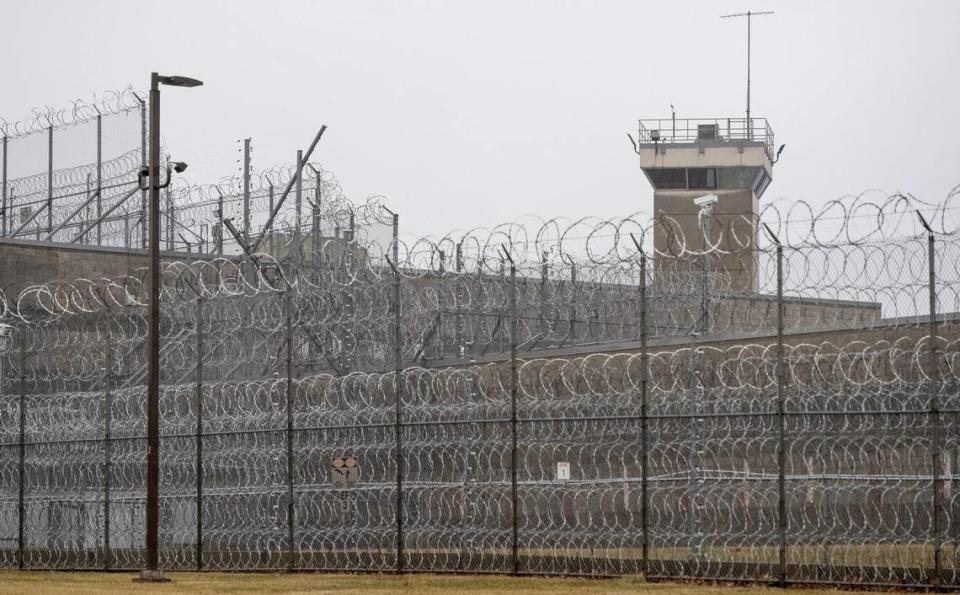Missouri ‘an outlier state’ in using death penalty. Only 4 others held executions in 2023
- Oops!Something went wrong.Please try again later.
Though support for capital punishment appears to be on the decline, Missouri ramped up its use of the death penalty this year, executing four people.
Missouri was one of five states that carried out executions in 2023, according to a report published Friday by the Death Penalty Information Center.
Texas, Florida, Oklahoma and Alabama also executed prisoners this year. A total of 24 people nationally died by lethal injection, including a man Thursday morning in Oklahoma in the last scheduled execution of 2023.
Forty states have abolished the death penalty, paused executions or have not executed anyone in the past 10 years.
No new capital sentences were handed down this year in the state.
According to a Gallup poll released in November, a majority of people now believe the death penalty is applied unfairly. Fifty-three percent said they still support the death penalty, down from 60% a decade ago.
This year, Missouri Gov. Mike Parson denied clemency to:
Amber McLaughlin, a 49-year-old transgender woman convicted of murdering her ex-girlfriend in 2003 in St. Louis County. The jury could not reach a decision on sentencing and a judge handed down McLaughlin’s death sentence. Missouri and Indiana are the only two states that allow a judge to impose capital punishment when a jury cannot make a decision. She was executed in January.
Leonard “Raheem” Taylor, 58, who claimed he was in another state when his girlfriend and her three children were murdered in 2004 in St. Louis County. The Missouri Supreme Court denied an evidentiary hearing and the U.S. Supreme Court denied a stay. As his February execution date neared, Taylor asked for a spiritual advisor to be with him in the execution chamber, a right that was granted after a Supreme Court ruling in 2022. The Missouri Department of Corrections rejected the request, saying it had been made too late.
Michael Tisius was given a stay by a federal appeals court after the 42 year old’s attorneys argued that a juror in his double murder trial was not qualified to serve because he could not read or write, a skill required by state law. The decision was appealed by the Missouri Attorney General’s Office and the stay was overturned. Five jurors also said they had changed their minds about the death sentence. Tisius was executed in June.
Johnny Johnson, 45, was convicted of murdering a six-year-old girl in 2002 in St. Louis County. He was granted a stay after his attorneys argued that he was mentally ill and believed Satan was using the state of Missouri to kill him and end the world. The victim’s father said he did not support capital punishment. The stay was reversed by a federal appeals court and he was executed in August.
Twelve people remain on death row in Missouri, including a man who says DNA evidence proves he was wrongfully convicted.
Marcellus “Khaliifah” Williams, 54, was sentenced to death in 2001 in the stabbing death of a woman in suburban St. Louis.
Forensic testing conducted in 2016 and using technology that was not available at the time of the homicide shows Williams is not a match for the DNA found on the murder weapon. His Aug. 22, 2017, execution was halted by former Gov. Eric Greitens, who initiated a board of inquiry. Parson dissolved the board and lifted the stay in June.
“This Board was established nearly six years ago, and it is time to move forward,” the governor said in a statement at the time. “We could stall and delay for another six years, deferring justice, leaving a victim’s family in limbo, and solving nothing. This administration won’t do that.”
Williams filed a lawsuit in August contending that going forward with his execution would violate his constitutional rights to due process.
Since 1973, 195 people on death row have been exonerated across the country, according to the Death Penalty Information Center.
The Missouri Attorney General’s Office has requested execution dates for Williams and another man, Brian Dorsey.

Elyse Max, co-director of Missourians to Abolish the Death Penalty, said Missouri “continues to be an outlier state” when it comes to its use of the death penalty.
“The folks that we executed would likely not be sentenced to death today because of evolving standards of decency and just the fact that jurors and lawyers are understanding more about things like late adolescent brain development and severe mental health issues,” she said.
“It’s just like reinforcing that executions are a political act done by a very few players at the top for political and not public safety reasons.”
Max said she expects several bills on the death penalty to be introduced during Missouri’s 2024 legislative session. Those will include a full repeal as well as what she called “abolition by attrition type bills,” which may include measures to protect people with several mental health problems and prevent a judge from sentencing someone to death when a jury deadlocks.
Max said support appears to be growing, especially with Republicans from the anti-abortion community.
During the legislative session this year, three bills to end the death penalty were introduced. They were sponsored by Rep. Sarah Unsicker, a Democrat running for attorney general, Rep. Patty Lewis, a Kansas City Democrat and Rep. Tony Lovasco, a Republican from St. Charles County.
Lewis and Lovasco said they plan on re-filing their bills in 2024.
“Allowing the State to hold so much power that it’s authorized to kill someone with premeditation is certainly not a ‘small government’ position,” Lovasco said in a statement to The Star. “Moreover, the deliberate ending of a human life in such a manner is clearly not a ‘pro-life’ action by any reasonable definition. In my view, opposition to the death penalty is the proper and consistent stance for any Republican to take.”

